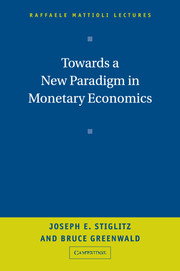Book contents
- Frontmatter
- Contents
- List of figures and table
- The Raffaele Mattioli Lectures
- Preface
- Part I The principles of the new paradigm
- Part II Applications of the new paradigm
- 8 Monetary policy
- 9 Regulatory policy and the new paradigm
- 10 Financial market liberalization
- 11 Restructuring the banking sector
- 12 Regional downturns and development and monetary policy
- 13 The East Asia crisis
- 14 The 1991 US recession and the recovery
- 15 The new paradigm and the “new economy”
- 16 Concluding remarks
- Bibliography
- Index
8 - Monetary policy
Published online by Cambridge University Press: 12 May 2010
- Frontmatter
- Contents
- List of figures and table
- The Raffaele Mattioli Lectures
- Preface
- Part I The principles of the new paradigm
- Part II Applications of the new paradigm
- 8 Monetary policy
- 9 Regulatory policy and the new paradigm
- 10 Financial market liberalization
- 11 Restructuring the banking sector
- 12 Regional downturns and development and monetary policy
- 13 The East Asia crisis
- 14 The 1991 US recession and the recovery
- 15 The new paradigm and the “new economy”
- 16 Concluding remarks
- Bibliography
- Index
Summary
A central reason for interest in monetary theory is that monetary policy remains one of the most effective means by which the government can control the level of the economy's activity, at least at certain times. It is by now well recognized that the mechanisms for self–adjustment of the economy are at best imperfect; that the economy, on its own, may have extended periods of underemployment or inflation. Traditional monetary theory has government controlling the money supply, which affects interest rates, which in turn affect the level of investment. Under the new paradigm:
(1) What affects the level of economic activity is the terms at which credit is made available to the private sector, and the quantity of credit, not the quantity of money itself.
(2) The relationship between the terms at which credit is available (e.g. the loan rate) and the T–bill (or deposit) rate may change markedly over time.
(3) Similarly, the supply of credit may not change in tandem with the money supply; and changes in the relationship between money and credit may be particularly marked in periods of crisis.
[…]
- Type
- Chapter
- Information
- Towards a New Paradigm in Monetary Economics , pp. 154 - 202Publisher: Cambridge University PressPrint publication year: 2003



